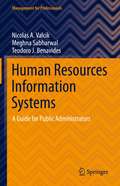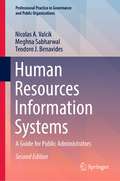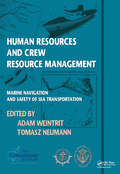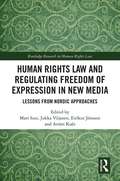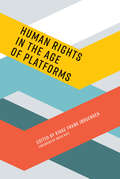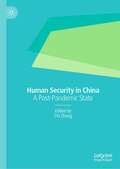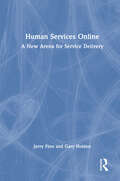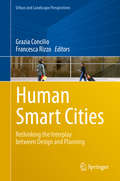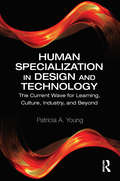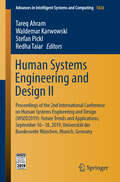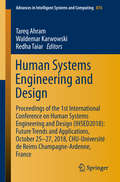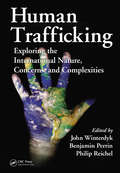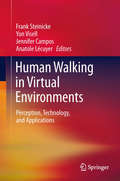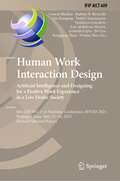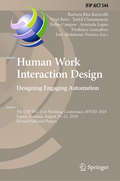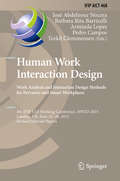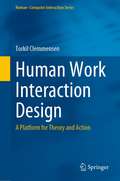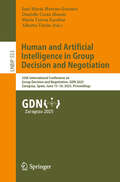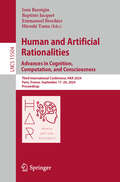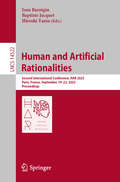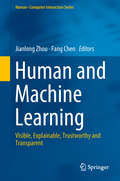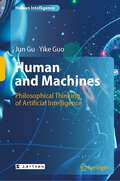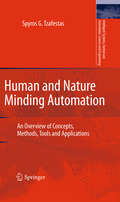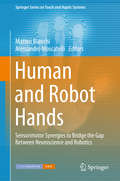- Table View
- List View
Human Resources Information Systems: A Guide for Public Administrators (Management for Professionals)
by Nicolas A. Valcik Meghna Sabharwal Teodoro J. BenavidesThis book provides an introduction to Human Resource Information Systems (HRIS) for those in the public administration field. At the intersection between human resource management and information technology, HRIS is often the key to having and maintaining the personnel data that is essential for hiring and recruitment, strategic planning and analysis, and legal requirements in most public organizations. This book describes what an HRIS system is, what the functionality of such a system should be, and outlines the practical aspects of an HRIS. It also compares the different aspects of human resources in public organizations, non-profit organizations, and private corporations, and how differences across organizations may influence the functionality requirements of the HRIS. Finally, the volume contains both an organizational theory component, which frames how an HRIS interacts with an organization both from a functional standpoint and a reporting standpoint. The book includes a practical component, which includes real-world case studies that illustrate the advantages and pitfalls to implementing an HRIS enterprise system. Providing a thorough introduction to HRIS for both academics and practitioners, this volume is appropriate for researchers, graduate students, and practitioners in the fields of public administration, higher education administration, information systems, computer science, and human resources.
Human Resources Information Systems: A Guide for Public Administrators (Professional Practice in Governance and Public Organizations)
by Nicolas A. Valcik Meghna Sabharwal Teodoro J. BenavidesThis volume provides an introduction to Human Resource Information Systems (HRIS) for those in the public administration field. At the intersection between human resource management and information technology, HRIS is often the key to having and maintaining the personnel data that is essential for hiring and recruitment, strategic planning and analysis, and legal requirements in most public organizations. Revised and updated for the second edition, this book describes what an HRIS system is, what the functionality of such a system should be, and outlines the practical aspects of an HRIS. It also compares the different aspects of human resources in public organizations, non-profit organizations, and private corporations, and how differences across organizations may influence the functionality requirements of the HRIS. Finally, the volume contains both an organizational theory component, which frames how an HRIS interacts with an organization both from a functional standpoint and a reporting standpoint. The book includes a practical component, which includes real-world case studies that illustrate the advantages and pitfalls to implementing an HRIS enterprise system. Providing a thorough introduction to HRIS for both academics and practitioners, this volume is appropriate for researchers, graduate students, and practitioners in the fields of public administration, higher education administration, information systems, computer science, and human resources.
Human Resources and Crew Resource Management: Marine Navigation and Safety of Sea Transportation
by Adam Weintrit Tomasz NeumannThe TransNav 2011 Symposium held at the Gdynia Maritime University, Poland in June 2011 has brought together a wide range of participants from all over the world. The program has offered a variety of contributions, allowing to look at many aspects of the navigational safety from various different points of view. Topics presented and discussed at the Symposium were: navigation, safety at sea, sea transportation, education of navigators and simulator-based training, sea traffic engineering, ship's manoeuvrability, integrated systems, electronic charts systems, satellite, radio-navigation and anti-collision systems and many others. This book is part of a series of six volumes and provides an overview of Human Resources and Crew Resource management and is addressed to scientists and professionals involved in research and development of navigation, safety of navigation and sea transportation.
Human Rights Law and Regulating Freedom of Expression in New Media: Lessons from Nordic Approaches (Routledge Research in Human Rights Law)
by Mart Susi Jukka Viljanen Eiríkur Jónsson Artūrs KučsThe Nordic countries are well known globally for their high human rights standards and, at the same time, high degree of internet freedom. This edited collection reveals how the Nordic countries have succeeded in the task of protecting freedom of expression in the new media. It contains an overview of public policy choices and best practices of domestic online companies, which have the aspiration of finding global acceptance. Reviewing the topic of freedom of expression in new media within Nordic and Baltic countries, this book incorporates both general themes and interesting country-specific themes that will provide wider knowledge on the development of freedom of expression and media law in the online media era. A comprehensive analysis of regulation of online media, both at the level of legislation and application of law in courts and other authorities, are included. This book will contribute to the ongoing discussion as to whether there is a need to modify prevailing interpretation of freedom of expression. Human Rights Law and Regulating Freedom of Expression in New Media focuses on the multi-layered and complicated relationship between internet and human rights law. It contributes to the ongoing discussion regarding the protection of freedom of expression on the internet in the context of various doctrines of constitutional law, including the proliferation of constitutional adjudication. It will be of interest to researchers, academics, policymakers, and students in the fields of human rights law, internet law, political science, sociology, cultural studies, media and communications studies and technology.
Human Rights in the Age of Platforms (Information Policy)
by Rikke Frank JørgensenScholars from across law and internet and media studies examine the human rights implications of today's platform society.Today such companies as Apple, Facebook, Google, Microsoft, and Twitter play an increasingly important role in how users form and express opinions, encounter information, debate, disagree, mobilize, and maintain their privacy. What are the human rights implications of an online domain managed by privately owned platforms? According to the Guiding Principles on Business and Human Rights, adopted by the UN Human Right Council in 2011, businesses have a responsibility to respect human rights and to carry out human rights due diligence. But this goal is dependent on the willingness of states to encode such norms into business regulations and of companies to comply. In this volume, contributors from across law and internet and media studies examine the state of human rights in today's platform society.The contributors consider the “datafication” of society, including the economic model of data extraction and the conceptualization of privacy. They examine online advertising, content moderation, corporate storytelling around human rights, and other platform practices. Finally, they discuss the relationship between human rights law and private actors, addressing such issues as private companies' human rights responsibilities and content regulation.ContributorsAnja Bechmann, Fernando Bermejo, Agnès Callamard, Mikkel Flyverbom, Rikke Frank Jørgensen, Molly K. Land, Tarlach McGonagle, Jens-Erik Mai, Joris van Hoboken, Glen Whelan, Jillian C. York, Shoshana Zuboff, Ethan ZuckermanOpen access edition published with generous support from Knowledge Unlatched and the Danish Council for Independent Research.
Human Security in China: A Post-Pandemic State
by Chi ZhangThis book explores the emergent concept of 'human security' within the political context of COVID-19 Chinese politics. For decades, Western nations have used 'human rights' as a rubric with which to scold Chinese leaders, betraying a fundamental unwillingness to accept diversity of governance systems. As COVID-19 has demonstrated, different governance systems yield different outcomes—the freedom of circulation, speech and movement in Western democracies yielding one, and use of surveillance, lockdowns, and private–public collaboration in China and Asian societies such as Korea and Singapore yielding another. Chinese political scientists have become fixated on the notion of 'human security,' a utilitarian concept which insists on the importance of protecting and extending human life via health care, technology, and a wide range of other systems—sometimes, in ways which contradict Western notions of human rights, even as they demonstrably achieve superior outcomes for the humans involved. Being the first English language book to explore these issues, this book aims to generate a sustained theoretical relevance in the aftermath of the crisis which is likely to have lasting effects on how people live and will be of note for political scientists, China scholars, and economists.
Human Services Online: A New Arena for Service Delivery
by Gary Holden Jerry FinnWill your agency or students have the training to use the Internet in practice?Human Services Online: A New Arena for Service Delivery focuses on ways that Human Services are using the Internet for service delivery, community education, collaboration, advocacy, social change, and resource development. This valuable book highlights the array of innovative services now being offered on the Internet and provides guidelines and cautions for human service professionals in using the Internet to enhance their services.Human Services Online: A New Arena for Service Delivery provides much-needed research and empirical evaluation related to human service online activities and points to areas where future research efforts should be directed. The book describes and evaluates cutting-edge Internet-based services, ethical and legal threats to agencies and consumers that may result from online activities, and theoretical discussions of issues that impact human services as consumers and human service agencies increasingly come online.Topics addressed in Human Services Online: A New Arena for Service Delivery include: online therapy/counseling online fundraising online recruitment of volunteers and virtual volunteer programs online consultation, continuing education, and training ethical, legal, and liability issues related to Web sites and online support online support groups and self-help online advocacy and activism promoting access for under-represented populations use of the Internet to impact specific social problems such as domestic violence or HIV/AIDS Human Services Online: A New Arena for Service Delivery provides guidelines and specific suggestions for agencies considering developing online services. The book examines model programs and their effectiveness so that other agencies can replicate them in their own areas, describes cutting-edge online services that today's human services students will need to be aware of as they enter the job market, and provides information for agencies that will enhance their ability to solicit volunteers and contributions on the Internet.
Human Smart Cities
by Grazia Concilio Francesca RizzoWithin the most recent discussion on smart cities and the way this vision is affecting urban changes and dynamics, this book explores the interplay between planning and design both at the level of the design and planning domains' theories and practices. Urban transformation is widely recognized as a complex phenomenon, rich in uncertainty. It is the unpredictable consequence of complex interplay between urban forces (both top-down or bottom-up), urban resources (spatial, social, economic and infrastructural as well as political or cognitive) and transformation opportunities (endogenous or exogenous). The recent attention to Urban Living Lab and Smart City initiatives is disclosing a promising bridge between the micro-scale environments, with the dynamics of such forces and resources, and the urban governance mechanisms. This bridge is represented by those urban collaborative environments, where processes of smart service co-design take place through dialogic interaction with and among citizens within a situated and cultural-specific frame.
Human Specialization in Design and Technology: The Current Wave for Learning, Culture, Industry, and Beyond
by Patricia A. YoungHuman Specialization in Design and Technology explores emerging trends in learning and training—standardization, personalization, customization, and specialization—with a unique focus on innovations specific to human needs and conditions. Analyzing evidence from current academic research as well as the popular press, this concise volume defines and examines the trajectory of instructional design and technologies toward more human-centered and specialized products, services, processes, environments, and systems. Examples from education, healthcare, business, and other sectors offer real-world demonstrations for scholars and graduate students of educational technology, instructional design, and business development. The book features insights into the future of professors, public schools, equity and access, extended technologies, open educational resources, and more, concluding with a set of concrete solutions.
Human Systems Engineering and Design II: Proceedings of the 2nd International Conference on Human Systems Engineering and Design (IHSED2019): Future Trends and Applications, September 16-18, 2019, Universität der Bundeswehr München, Munich, Germany (Advances in Intelligent Systems and Computing #1026)
by Stefan Pickl Waldemar Karwowski Tareq Ahram Redha TaiarThis book focuses on novel design and systems engineering approaches, including theories and best practices, for promoting a better integration of people and engineering systems. It covers a range of hot topics related to: development of human-centered systems; interface design and human-computer interaction; usability and user experience; emergent properties of human behavior; innovative materials in manufacturing, biomechanics, and sports medicine, safety engineering and systems complexity business analytics, design and technology and many more. The book, which gathers selected papers presented at the 2nd International Conference on Human Systems Engineering and Design: Future Trends and Applications (IHSED 2019), held on September 16-18, 2019, at Universität der Bundeswehr München, Munich, Germany, provides researchers, practitioners and program managers with a snapshot of the state-of-the-art and current challenges in the field of human systems engineering and design.
Human Systems Engineering and Design: Proceedings of the 1st International Conference on Human Systems Engineering and Design (IHSED2018): Future Trends and Applications, October 25-27, 2018, CHU-Université de Reims Champagne-Ardenne, France (Advances in Intelligent Systems and Computing #876)
by Waldemar Karwowski Tareq Ahram Redha TaiarThis book focuses on novel design and systems engineering approaches, including theories and best practices, for promoting a better integration of people and engineering systems. It covers a range of hot topics related to: development of activity-centered and user-centered systems; interface design and human-computer interaction; usability and user experience; cooperative, participatory and contextual models; emergent properties of human behavior; innovative materials in manufacturing, and many more. Particular emphasis is placed on applications in sports, healthcare, and medicine. The book, which gathers selected papers presented at the 1st International Conference on Human Systems Engineering and Design: Future Trends and Applications (IHSED 2018), held on October 25-27, 2018, at CHU-Université de Reims Champagne-Ardenne, France, provides researchers, practitioners and program managers with a snapshot of the state-of-the-art and current challenges in the field of human systems engineering and design.
Human Trafficking: Exploring the International Nature, Concerns, and Complexities
by Benjamin Perrin John Winterdyk Philip ReichelHuman trafficking is a crime that undermines fundamental human rights and a broader sense of global order. It is an atrocity that transcends borders with some regions known as exporters of trafficking victims and others recognized as destination countries. Edited by three global experts and composed of the work of an esteemed panel of contributors,
Human Walking in Virtual Environments: Perception, Technology, and Applications
by Anatole Lécuyer Frank Steinicke Jennifer Campos Yon VisellThis book presents a survey of past and recent developments on human walking in virtual environments with an emphasis on human self-motion perception, the multisensory nature of experiences of walking, conceptual design approaches, current technologies, and applications. The use of Virtual Reality and movement simulation systems is becoming increasingly popular and more accessible to a wide variety of research fields and applications. While, in the past, simulation technologies have focused on developing realistic, interactive visual environments, it is becoming increasingly obvious that our everyday interactions are highly multisensory. Therefore, investigators are beginning to understand the critical importance of developing and validating locomotor interfaces that can allow for realistic, natural behaviours. The book aims to present an overview of what is currently understood about human perception and performance when moving in virtual environments and to situate it relative to the broader scientific and engineering literature on human locomotion and locomotion interfaces. The contents include scientific background and recent empirical findings related to biomechanics, self-motion perception, and physical interactions. The book also discusses conceptual approaches to multimodal sensing, display systems, and interaction for walking in real and virtual environments. Finally, it will present current and emerging applications in areas such as gait and posture rehabilitation, gaming, sports, and architectural design.
Human Work Interaction Design. Artificial Intelligence and Designing for a Positive Work Experience in a Low Desire Society: 6th IFIP WG 13.6 Working Conference, HWID 2021, Beijing, China, May 15–16, 2021, Revised Selected Papers (IFIP Advances in Information and Communication Technology #609)
by Arminda Lopes Torkil Clemmensen José Abdelnour-Nocera Frederica Gonçalves Ganesh Bhutkar Barbara R. Barricelli Qin Xiangang Fei Lyu Ronggang Zhou Wenjun HouThis book constitutes the thoroughly refereed post-conference proceedings of the 6th IFIP WG 13.6 Working Conference on Human Work Interaction Design, HWID 2021, held in Beijing, China, in May, 2021. The 10 revised and extended full papers presented were carefully selected for inclusion in this volume. The papers deal with the analysis and interaction design of a variety of complex work and life contexts found in different business and application domains. They focus on interaction design for work engagement taking usability of interactive systems to the next level by providing employees pleasurable and meaningful experiences via the tools used at work. The papers are organized the following topical sub-headings: Trends in human Work Interaction Design; Workplace & work experience Analysis for Interaction Design; and Artificial Intelligence (AI) for Human Work.
Human Work Interaction Design. Designing Engaging Automation: 5th IFIP WG 13.6 Working Conference, HWID 2018, Espoo, Finland, August 20 - 21, 2018, Revised Selected Papers (IFIP Advances in Information and Communication Technology #544)
by Barbara Rita Barricelli Arminda Lopes Pedro Campos Torkil Clemmensen José Abdelnour-Nocera Virpi Roto Frederica GonçalvesThis book constitutes the thoroughly refereed post-conference proceedings of the 5th IFIP WG 13.6 Working Conference on Human Work Interaction Design, HWID 2018, held in Espoo, Finland, in August 2018.The 19 revised and extended full papers presented were carefully selected for inclusion in this volume. The papers deal with the analysis and interaction design of a variety of complex work and life contexts found in different business and application domains. They focus on interaction design for work engagement taking usability of interactive systems to the next level by providing employees pleasurable and meaningful experiences via the tools used at work. The papers are organized in two sections: the first section presents cases of HWID in practice, while the second one focuses on methodological discussion.
Human Work Interaction Design. Work Analysis and Interaction Design Methods for Pervasive and Smart Workplaces
by José Abdelnour Nocera Barbara Rita Barricelli Arminda Lopes Pedro Campos Torkil ClemmensenThis book constitutes the thoroughly refereed post-conference proceedings of the 4th IFIP WG 13. 6 Working Conference on Human Work Interaction Design, HWID 2015, held in London, UK, in June 2015. The 15 revised full papers presented were carefully selected for inclusion in this volume. The papers reflect many different areas and address many complex and diverse work domains, focusing on the integration of work analysis and interaction design methods for pervasive and smart workplaces. They are organized in the following sections: methodologies; environment, and specific contexts.
Human Work Interaction Design: A Platform for Theory and Action (Human–Computer Interaction Series)
by Torkil ClemmensenAn approach to socio-technical HCI called Human Work Interaction Design (HWID) emerged around 2005. It has grown steadily, and now is the time for sharing this research with a wider audience. In this book, the HWID approach is used to discuss socio-technical HCI theory, cases, methods, and impact. The book introduces HWID as a multi-sided platform for theorizing about socio-technical HCI work design in the digital age. It presents design cases that illustrate the design of socio-technical relations, provides specific advice for researchers, consultants, and policy makers, and reflects on the open issues related to theorizing about sociotechnical HCI. The benefits of HWID include that it meets the requirement of taking both the social and the technical into account, while focusing strongly on the relationship between the social and the technical. In addition, it is truly international and explicitly considers local cultural, organizational, and technological contexts.
Human and Artificial Intelligence in Group Decision and Negotiation: 25th International Conference on Group Decision and Negotiation, GDN 2025, Zaragoza, Spain, June 15–18, 2025, Proceedings (Lecture Notes in Business Information Processing #553)
by Danielle Costa Morais José María Moreno-Jiménez María Teresa Escobar Alberto TurónThis book constitutes the refereed proceedings of the 25th International Conference on Group Decision and Negotiation, GDN 2025, which took place in Zaragoza, Spain, during June 2025. The field of Group Decision and Negotiation focuses on decision processes with at least two participants and a common goal but conflicting individual goals. Research areas of Group Decision and Negotiation include electronic negotiations, experiments, the role of emotions in group decision and negotiations, preference elicitation and decision support for group decisions and negotiations, and conflict resolution principles. The 12 full papers included in these proceedings were carefully reviewed and selected from 99 submissions. They were organized in topical sections as follows: AI, Ethics, and Societal Impact in Group Decision and Negotiation; Preference Modeling, Evaluation, and Decision Support in Group Contexts; and Conflict Modeling in Complex Decision Environments.
Human and Artificial Rationalities. Advances in Cognition, Computation, and Consciousness: Third International Conference, HAR 2024, Paris, France, September 17–20, 2024, Proceedings (Lecture Notes in Computer Science #15504)
by Jean Baratgin Baptiste Jacquet Hiroshi Yama Emmanuel BrochierThis book constitutes the proceedings of the Third International Conference on Human and Artificial Rationalities, HAR 2024, which took place in Paris, France, in September 2024. The 19 full papers and 4 short papers included in this book were carefully reviewed and selected from 52 submissions. They are organized under the following topical sections: Artificial reasoning and models; Moral reasoning; Artificial intelligence and cognition; Rationality and Dual Process; Reasoning and special needs; Education; Experimental procedures in cognition. * This book also contains one additional paper from the HAR 2023 conference.
Human and Artificial Rationalities: Second International Conference, HAR 2023, Paris, France, September 19–22, 2023, Proceedings (Lecture Notes in Computer Science #14522)
by Jean Baratgin Baptiste Jacquet Hiroshi YamaThis book constitutes the proceedings of the Second International Conference on Human and Artificial Rationalities, HAR 2023, which took place in Paris, France, in September 2023. The 18 full and 5 short papers included in this book were carefully reviewed and selected from 39 submissions. They were organized in topical sections as follows: Human and artificial thinking; human thinking and reasoning; neuropsychology and interaction; artificial agents and interaction; and applied reasoning. This volume also contains 2 invited talks in full-paper length.
Human and Machine Learning: Visible, Explainable, Trustworthy and Transparent (Human–Computer Interaction Series)
by Fang Chen Jianlong ZhouWith an evolutionary advancement of Machine Learning (ML) algorithms, a rapid increase of data volumes and a significant improvement of computation powers, machine learning becomes hot in different applications. However, because of the nature of “black-box” in ML methods, ML still needs to be interpreted to link human and machine learning for transparency and user acceptance of delivered solutions. This edited book addresses such links from the perspectives of visualisation, explanation, trustworthiness and transparency. The book establishes the link between human and machine learning by exploring transparency in machine learning, visual explanation of ML processes, algorithmic explanation of ML models, human cognitive responses in ML-based decision making, human evaluation of machine learning and domain knowledge in transparent ML applications. This is the first book of its kind to systematically understand the current active research activities and outcomes related to human and machine learning. The book will not only inspire researchers to passionately develop new algorithms incorporating human for human-centred ML algorithms, resulting in the overall advancement of ML, but also help ML practitioners proactively use ML outputs for informative and trustworthy decision making. This book is intended for researchers and practitioners involved with machine learning and its applications. The book will especially benefit researchers in areas like artificial intelligence, decision support systems and human-computer interaction.
Human and Machines: Philosophical Thinking of Artificial Intelligence (Human Intelligence)
by Yike Guo Jun GuThis book shares Chinese scholars’ philosophical views on artificial intelligence. The discussions range from the foundations of AI—the Turing test and creation of machine intelligence—to recent applications of AI, including decisions in games, natural languages, pattern recognition, prediction in economic contexts, autonomous behaviors, and collaborative intelligence, with the examples of AlphaGo, Microsoft’s Xiao Bing, medical robots, etc. The book’s closing chapter focuses on Chinese machines and explores questions on the cultural background of artificial intelligence. Given its scope, the book offers a valuable resource for all members of the general public who are interested in the future development of artificial intelligence, especially from the perspective of respected Chinese scholars.
Human and Nature Minding Automation
by Spyros G. TzafestasThis book examines the "symbiosis" of automation and technology with the human and the nature towards the ultimate goal of assuring global sustainability. Throughout the years a variety of approaches, technologies and practices have been produced in the direction of achieving human-and nature-minding automation and industrial activity. In this book an attempt is made, for the first time, to present in a cohesive and consolidated way an overview of all these issues together, and show how they combine to provide human-and nature-minding (green) systems. Human-minding automation is possible by employing concepts and techniques from the human factors and ergonomics fields, including job satisfaction, human-friendly interfaces, and human values, whereas nature-minding industrial activity and human development can be achieved by considering as a whole the human, economic, natural and cultural resources in the short and long term. In particular, nature-minding design selects the production methods and technologies that have the minimum impact to the nature. The book is intended for use both as a free reference conceptual book, and as general introductory book in relevant teaching and research environments.
Human and Robot Hands
by Matteo Bianchi Alessandro MoscatelliThis booklooks at the common problems both human and robotic hands encounter when controllingthe large number of joints, actuators and sensors required to efficientlyperform motor tasks such as object exploration, manipulation and grasping. The authorsadopt an integrated approach to explore the control of the hand based onsensorimotor synergies that can be applied in both neuroscience androbotics. Hand synergies are based on goal-directed, combined muscle andkinematic activation leading to a reduction of the dimensionality of the motorand sensory space, presenting a highly effective solution for the fast and simplifieddesign of artificial systems. Presented intwo parts, the first part, Neuroscience, provides the theoretical andexperimental foundations to describe the synergistic organization of the humanhand. The second part, Robotics, Models and Sensing Tools, exploits theframework of hand synergies to better control and design robotic hands andhaptic/sensing systems/tools, using a reduced number of control inputs/sensors,with the goal of pushing their effectiveness close to the natural one. Human andRobot Hands provides a valuable reference for students, researchers anddesigners who are interested in the study and design of the artificial hand.
Human vs ChatGPT – Language of Advertising in Beauty Products Advertisements
by Ida Skubis Dominika KołodziejczykThis book systematically investigates the linguistic strategies employed in beauty product advertising to assess their persuasive and manipulative effects. The work is divided into two sections: a review of relevant literature and an empirical analysis of advertisements. The analysis initially focuses on the linguistic features of advertisements created by humans prior to the introduction of ChatGPT, examining the linguistic measures used and their methods of persuasion and manipulation. Subsequent sections provide a detailed examination of advertisements generated by ChatGPT versions 3.5 and 4.0, analysing the artificial intelligence’s use of linguistic techniques. This includes a meta-analysis where ChatGPT itself discusses the linguistic strategies it employs. The ultimate goal is to compare and contrast the effectiveness and linguistic devices used in advertisements crafted by humans and those by ChatGPT, analysing how AI influences the language of advertising and its impact on consumer behaviour.
